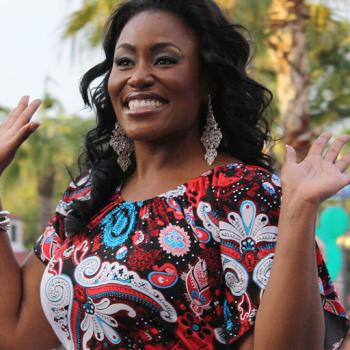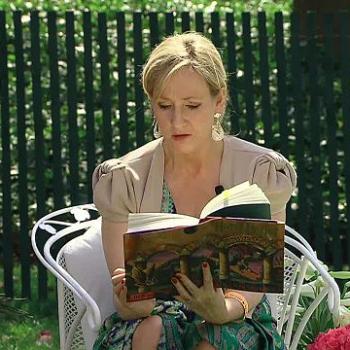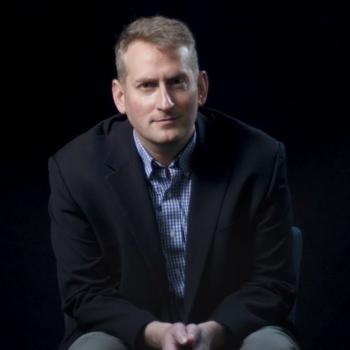
This past week, The New Yorker ran an in-depth story on evangelical millennials. The story was a mildly interesting read, despite its headline: “Millennial Evangelicals Diverge from Their Parents’ Beliefs.” (Perhaps next week The New Yorker will give us an in-depth report on the fact that “Politicians Lie,” or “Hot Pockets Suck.”) Reporter Eliza Griswold mixes firsthand impressions of a young church plant in Philadelphia with commentary from people like Ed Stetzer, Ekemini Uwan and Jonathan Merritt. Taken together, it all conveys an impression of a generation tired of outdated “culture wars,” ready to hit reboot on the faith of their fathers. Unsurprisingly, The New Yorker approves.
Inter alia, the article includes a book plug for Merritt’s latest, Learning to Speak God From Scratch. Merritt gives us a taste of what readers can expect by opining on “the feminine aspect of God,” why Christians should stop using “brokenness” to describe same-sex orientation (Merritt himself came out as gay after being blackmailed by a blogger) and why he’s “personally pro-life” but wouldn’t “pull a lever and overturn Roe vs. Wade.”
Ekemini Uwan is even blunter, explicitly saying the 1973 travesty should not be overturned, as it is “the law of the land.” For this reason, she says she opposes Brett Kavanaugh, apparently worried that he might vote to overturn it (one could only hope). Ms. Uwan is described in the article as a “public theologian.” In a word, oy.
More interesting is Griswold’s conversation with a student church planter named Julio Colon-Laboy. Laboy is soft-spoken and winsome, a natural poster boy for millennial Christianity. He discusses his immigrant background, his personal testimony of finding Christianity after a suicide attempt, and his experience talking young women out of abortions. Griswold calls him away from a table where he has a sign-up sheet for a summer-long Bible study just on the book of James.
Sadly, despite Colon-Laboy’s warm-heartedness and private pro-life activism, he is desperately confused on the legal questions around abortion. He expresses a vague worry that repealing “the law of the land” might have “unintended consequences” for minority communities. Somebody should sit down with Colon-Laboy and break down the intended consequences of Planned Parenthood’s legalized operations in those very communities. The racist history of the organization is no secret. We are talking about an outfit that literally pays for billboards targeted to black women with the message “Abortion is self-care.” [Edit: It’s been pointed out that technically The Afiya Foundation is not an arm of Planned Parenthood, though Afiya “partners with” Planned Parenthood in Dallas. My apologies for carelessly saying Planned Parenthood directly pays for eugenic billboard campaigns when they merely partner with the kind of outfit that pays for eugenic billboard campaigns.] If justice specifically for minorities is Colon-Laboy’s passion, then there is only one decent place for him to stand here. Yet, confusingly, in a different part of the report Griswold says Colon-Laboy “opposes abortion rights.” Similarly, she writes that Merritt “opposes abortion.” Conservative readers should take note of this bit of inflation in our linguistic currency.
This paragraph is particularly revealing (emphasis added):
For young believers at Block and elsewhere, the ubiquity of Facebook, Twitter, Instagram, and other social networks in their lives, among other factors, have made it more difficult to live in the kind of theological, cultural, and political isolation that previous generations once did. And, as their secular peers embrace more fluid identities in regard to sexuality and race, young evangelicals are also beginning to see such positions in shades of gray rather than in black and white. There are other factors, too, related to globalization: the exponential growth of fellow-believers in the Global South; the growing diversity of evangelicals in the U.S., driven in part by the influx of immigrants who arrive in American churches with their own dynamic faith. The result is that younger evangelicals are speaking out on issues like family separation at the border, climate change, police brutality, and immigration reform––causes not typically associated with the evangelical movement.
Indeed, on homosexuality in particular, the statistics don’t lie. As quoted in the piece, over half of all 18-29-year-old evangelicals support same-sex “marriage.” And I can attest from personal experience that even young people who would still check “No” here often lack a firm foundation for that “No.” If you ask them to give reasons, they might tell you God is against it, but they’re not exactly sure why. This points up a huge gap in the education of the evangelical mind, one which my co-blogger Gregory Shane Morris rightly argues we must fill with a solid grounding in natural law. Unfortunately, people like Jonathan Merritt are explicitly cutting off such arguments at the pass, by attacking the very notion of a disordered or unnatural sexual orientation.
Note also the issues that are being given new priority. “Climate change” is my favorite. At least one could have something approximating a reasonable conversation about issues like police brutality or immigration policy. On the matter of police overreach in particular, I am actually sympathetic to the idea that there needs to be a top-down reform of how police engage with citizens. Do I think the problem is easily reducible to racism? No, but at least there’s a conversation to be had. “Climate change,” on the other hand… forgive me, but to anyone who thinks this is something to agitate about on a par with abortion, please go home and rethink your agitating priorities. Also, clean your room. (Sorry. My inner Jordan Peterson tends to rise to the fore in such moments.)
Even on immigration reform, where there’s room for nuance and humility given the scope of the problem, millennial activists like Ekemini Uwan are using it to create a false dichotomy with pro-life activism. Immediately after her statement that Roe vs. Wade is the law of the land and we should move on and “stop fighting battles we’ve already lost,” she says “we should be focused on kids in cages right now.” Implication: instead of focusing on kids being dismembered and scorched in acid right now.
However, the Democratic Party’s pro-abortion rhetoric finally seems to be blatant enough that many Christian millennials do balk at pulling the blue lever. In the piece, youth pastor Samuel Rodriguez discusses how Hillary Clinton’s rhetoric has gone farther than Obama’s towards “putting up a wall” on abortion between the Democrat party and the evangelical voting bloc, including the younger generation. Obama, by contrast with Clinton, padded his statements on abortion with rhetoric saying it was a “complex moral issue” and that the question of when life begins is “above his pay grade.” Never mind, of course, that his administration hounded states which tried to withhold Medicaid from abortion clinics, then went about distributing pork to make sure Planned Parenthood wanted for nothing. But he had an “abortion reduction task force” (on which Rodriguez served), so that made it okay. Democrat politicians, take note: Millennials prefer bullshit, so try dialing back the honesty next time.
All this being said, I’m no stranger to political homelessness. And I’m not here to say that there is nothing to correct for in the political attitudes of the generation that came before me and my fellow millennials. As I wrote in my post-election piece “The Religious Right Is Dead, Long Live the Religious Right,” we do need to recognize that the Falwell generation revealed a serious blind spot when they threw their weight behind Trump. It was the tragic reductio of that generation’s tragically naive and false notion that our first priority is getting our foot in the right political door. Few sights of 2016 were sadder to me than James Dobson’s painful attempts to make himself feel better about his Trump endorsement by telling his followers that Trump was “a baby Christian,” and other such nonsense. Good people of my own acquaintance were similarly in denial.
But if the older generation could be foolish and naive, the next generation is no wiser, despite the impression The New Yorker would like to give. They have no fewer blind spots than their elders. They just have different blind spots. I already discussed young Julio’s staggeringly foolish comments about Roe vs. Wade, which make no sense from any social justice angle. (So tone-deaf is he to this contradiction that he even tells the reporter how “as a young person who cares about social justice,” it “breaks his heart” to be “lumped in” with the kinds of people who “picket outside abortion clinics.”)
Julio also manifests the shallow understanding of Scripture that typifies his generation, specifically the life and teachings of Christ. The piece makes much of the fact that whereas the older generation took verses “out of context” to be used as political weapons in the culture wars, the new generation takes their Bible study seriously and focuses on “the example of Jesus’s life.” Yet apparently, Julio’s main takeaway from Jesus’s life was that he mostly went about “breaking down gender roles” and “taking on racial issues,” and this was what really aroused hatred in the people around him. No examples are given to clarify what he even thinks this means. Ditto for any of the actual reasons why people hated Jesus.
If the lessons of this article could be summed up in a sentence, it’s that millennial evangelicals have no clear vision of what it means to be conservative without being Republican. They are not being taught about constitutional law or the separation of powers. They are not being taught about where money comes from. They are not being taught fundamental truths like Thomas Sowell’s dictum that “There are no solutions, only tradeoffs and compromises.” It is this kind of ignorance that leads young people to really, earnestly believe that it is just as meaningful to demonstrate “against climate change” as it is to demonstrate against abortion. It is this kind of naivete that leads them to accept Roe vs. Wade as “the law of the land” without even pausing to wonder if there isn’t something a bit odd about nine robed men passing a court decision and calling it “law.”
And who will teach them? Jonathan Merritt? Ekemini Uwan?
In my aforementioned reflection on the Religious Right, I propose that what we need in our current landscape (but desperately lack examples of) is a “third-way conservative evangelical.” Because I am shameless and lazy, and because this is apt, I quote my own description of what this kind of evangelical looks like:
The third-way conservative evangelical is a hard-nosed, card-carrying member of the Vast Right-Wing Conspiracy, to the bone. You can’t guilt-trip him by wagging your finger under his nose. You can’t wheedle him into modifying his “tone,” going out of his way to be “sensitive” to certain mascot groups, or making sure he talks just as much about x issue as he does about y issue. At the same time, you can’t pull the wool over his eyes with empty promises. You can’t fast-talk him into buying a bottle of snake oil with a ‘Murrca label slapped onto it. You can’t elicit a Pavlovian reaction from him with cliched soundbites like “When I’m President, we’re all gonna be saying Merry Christmas again!” He’s pessimistic enough to know better.
Sorry, I know that’s a downbeat note to end things on, but there it is. Our parents have made mistakes, it’s true. Let’s not make the same mistakes again. But let’s not make new mistakes either.













